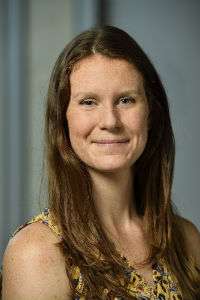
Q&A: Alyssa Auvinen
August 19, 2019
Food plays a multifaceted role in our lives, and Bloomberg Fellow Alyssa Auvinen has looked at our food system from different angles. For a county health department in Montana, she launched and managed a new farmers market. Then she became a farmer for a time. Now, at the Washington State Department of Health, she’s addressing food insecurity and working to get healthier foods into families’ hands.
Alyssa, who is pursuing an MPH at the Johns Hopkins Bloomberg School of Public Health, spoke with us about food, farming and how her classwork is helping her succeed in her job.
Tell us about your role at the Washington State Department of Health.
I manage a grant focused on food security and nutrition. I’m fortunate that this program lets me work with all different aspects of the food system. I work with 90 different farmers markets, a large supermarket chain, and healthcare providers to operate a handful of programs that help peoples’ Supplementation Nutrition Assistance Program (SNAP) benefits go further when they’re buying fruits and vegetables. Essentially, SNAP participants receive extra money to buy more produce.
Prior to working at the department of health, you spent a year farming. What was that experience like?
It was awesome. I had found managing the farmers market in Montana really invigorating. I loved working with farmers. I realized I wanted to see another part of the food system in action and the stars aligned for me.
Volunteering through World Wide Opportunities on Organic Farms, I helped out on small to mid-sized organic farms across the western United States. I ended up trading my labor for food and a place to sleep. It was really great to see different communities and how farmers were making a living.
It gave me an inside look at a part of our food system that isn’t always accessible to consumers. I was able to see how fruits and vegetables, like the ones sold at the farmers market in Montana, were produced.
What made you interested in the world of food and farming?
I was originally drawn to food in Montana. When I moved there in 2010, I knew no one. And after a few months of pitying myself and feeling lonely, I was introduced to a couple of folks who did anti-hunger work at the Salvation Army. I was ignited by that work.
I realized that food is something that connects people. Who doesn’t appreciate sharing a meal with someone? It can help build a community. It helped build my community in Montana.
Have you been able to apply your classwork to your job?
Absolutely. The first class I took was Problem Solving in Public Health. Part of that course is trying to break down and understand the key steps to making decisions as a group. I can honestly say I use those steps on a weekly basis in my job.
I manage a lot of partnerships, and drawing on what I learned in that class, I try to make sure everyone’s voices are heard and that we’re successfully going from brainstorming to making a clear decision.
Connect With Us
Receive all the latest news from the Initiative by signing up for the American Health Dispatch newsletter, subscribing to the American Health Podcast, and subscribing to our YouTube channel.
Contact Us